A water heater is an essential appliance in any home, ensuring a steady supply of hot water for various household activities.
However, like any other device, water heaters are prone to issues that may affect their performance and urge you to fix water heater.
In this comprehensive guide, we will:
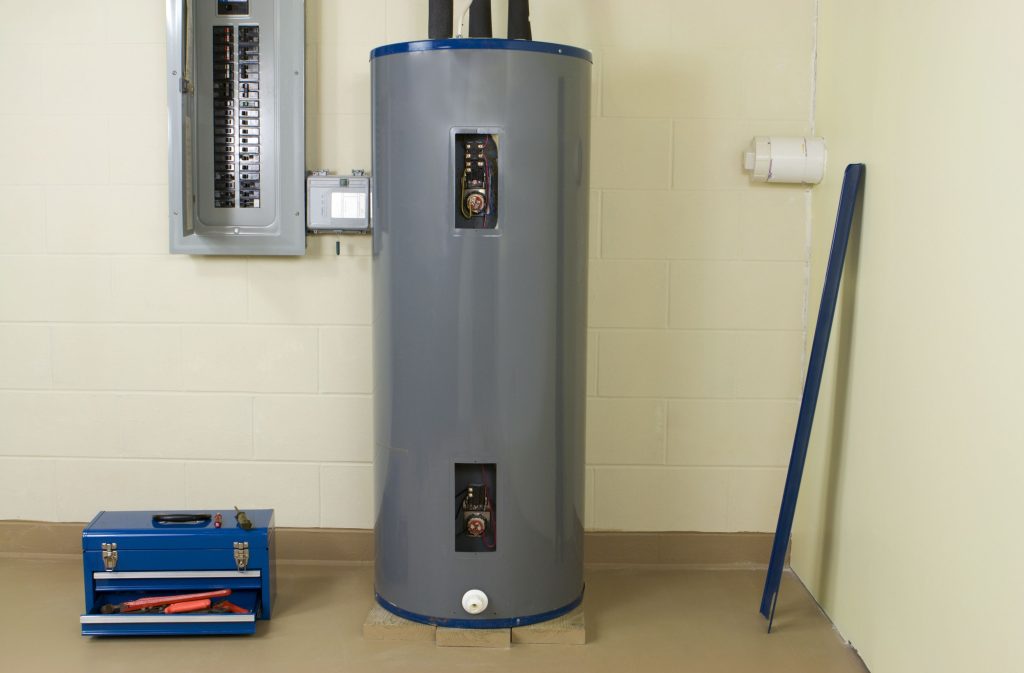
When encountering issues with an electric water heater, several tasks can help fix water heater problems.
These include resetting the thermostat, replacing the heating element if malfunctioning, and thoroughly testing the electric water heater to ensure proper functionality.
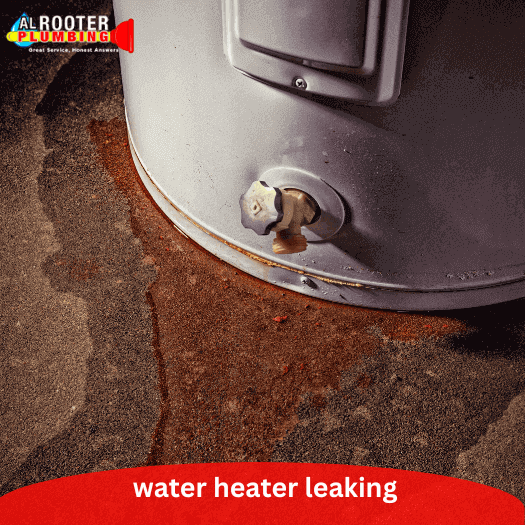
1- Identify the Issue:
Begin by assessing common water heater problems, such as a lack of hot water, a water heater leak, or you need to fix water heater.
Determine whether the water heater’s tank is leaking or if there’s a lack of hot water due to issues like a malfunctioning heating element.
2. Inspect the Water Heater’s Components:
Examine the upper and lower heating elements, the reset button, and the temperature settings on the water heater’s control panel.
Check for any visible signs of damage or corrosion.
If the water heater isn’t producing hot water, you need to fix water heater.
3. Address Water Leaks:
If there’s a water heater leak, shut off the water supply to the water heater’s tank.
Inspect the cold water inlet and the hot water outlet connections for any loose fittings or corrosion.
4. Check Water Temperature and Pressure:
Examine the water temperature and pressure.
If the water isn’t warm or hot enough, adjust the temperature setting on the water heater.
Additionally, assess the overall water pressure and address any issues that may impact hot water flow.
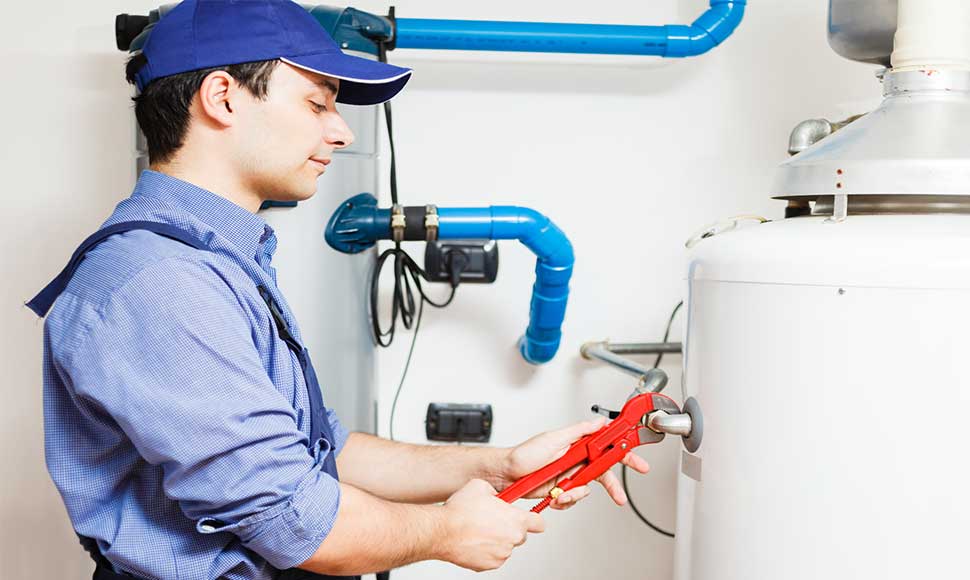
5. Perform Necessary Repairs:
Based on the assessment, troubleshoot and fix water heater through the identified problems.
This may involve resetting the heating elements, replacing faulty components, or addressing issues with the power supply.
Al Rooter Plumbing, specializing in water heater repair in Houston, has the expertise to fix water heater efficiently and effectively.
For more complex problems or if you’re unsure about how to fix water heater, it’s recommended to contact Al Rooter Plumbing for professional assistance.
They can provide expert advice and, if necessary, replace your water heater to ensure a reliable supply of hot water in your Houston home.
1- Sediment Buildup:
Over time, sediment, minerals, and debris can accumulate at the bottom of the water heater tank.
This buildup reduces the efficiency of the heating element, leading to decreased performance and potentially causing the water heater to overheat or make rumbling noises.
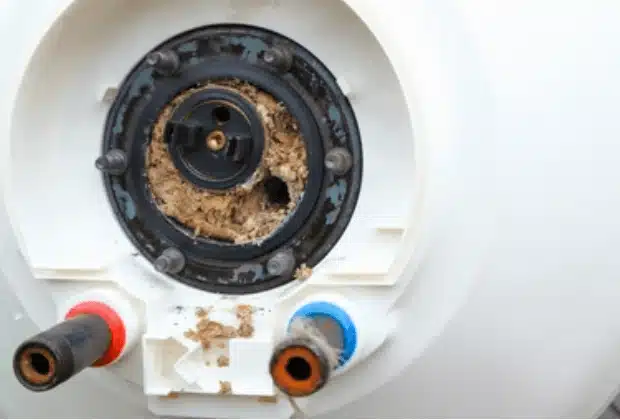
2- Heating Element Issues:
The heating element is responsible for heating the water inside the tank.
Common issues include a faulty or burned-out heating element, resulting in insufficient hot water or water that is not heated to the desired temperature.
3- Pressure Relief Valve (PRV) Problems:
The pressure relief valve is a safety feature that releases excess pressure from the tank.
If the PRV is faulty or malfunctions, you need to fix water heater as it can lead to leaks, reduced efficiency, or even tank rupture.
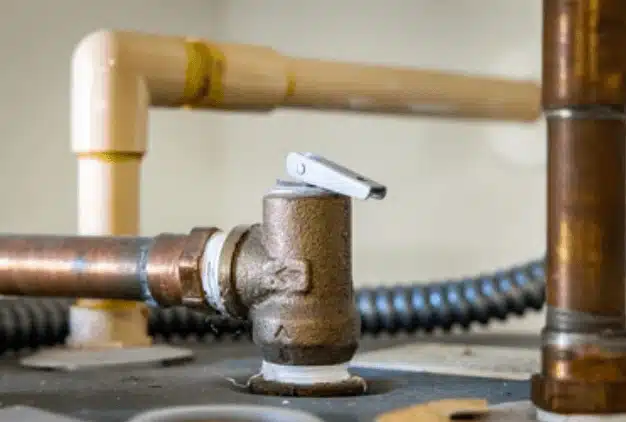
4- Leaking Tank:
Leaks can occur due to corrosion, rust, or cracks in the water heater tank.
Water around the base of the unit or visible rust on the tank are indicators of potential leaks.
A leaking tank can result in water damage and, if severe, may necessitate the replacement of the entire water heater.
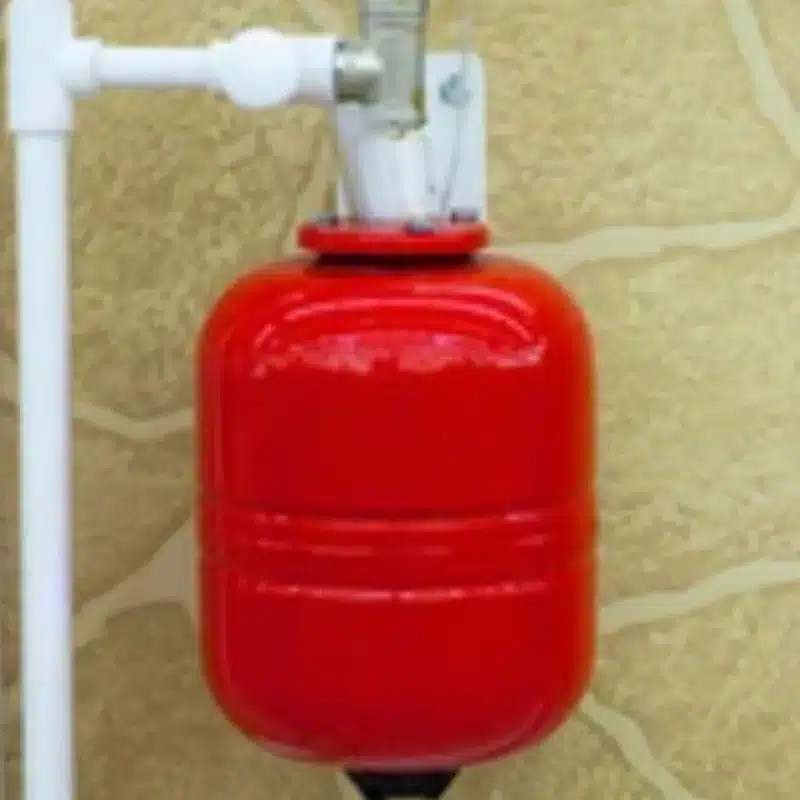
5- Faulty Thermostat:
The thermostat controls the temperature of the water inside the tank.
A malfunctioning thermostat can lead to water that is too hot, not hot enough, or inconsistent temperature levels.
Regular checking and calibration of the thermostat can help ensure proper temperature control.
Several signs indicate the need for water heater replacement, such as persistent leaks, a decline in performance, or the age of the appliance.
Factors to consider when replacing a water heater and the steps involved in the replacement process are crucial to ensure a seamless transition.
Regular maintenance is essential for prolonging the lifespan of a water heater.
Maintenance tips, reducing sediment buildup in the water heater tank is important practices in preserving the functionality of the water heater.
Resetting a hot water heater is a straightforward process, but it’s important to note that not all water heaters have a reset button.
If your water heater does have a reset button, follow these general steps:
1- Turn Off the Power:
Locate the power supply to the water heater and turn it off. For electric water heaters, this typically involves flipping the breaker in the electrical panel.
For gas water heaters, you may need to turn the thermostat to the “Pilot” position.
2- Locate the Reset Button:
On some electric water heaters, you will find a reset button on the thermostat or control panel.
This button is often red and may be labeled “Reset” or “High Limit.”
Gas water heaters usually do not have a reset button.
3- Press the Reset Button:
Once the power is off, press the reset button. Hold it down for a few seconds.
This action resets the high-temperature limit switch, which may have tripped due to overheating.
4- Wait and Restore Power:
After pressing the reset button, wait for a few minutes to allow the system to reset.
Once the waiting period is over, turn the power back on.
For electric water heaters, flip the breaker back to the “On” position.
For gas water heaters, turn the thermostat back to the desired setting.
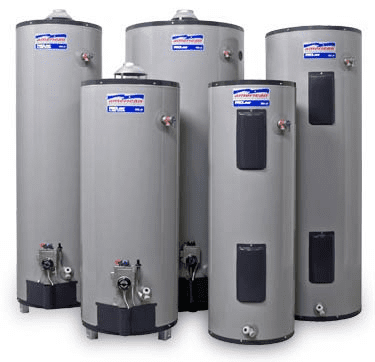
5- Check for Operation:
Turn on a hot water faucet in your home to check if the water heater is producing hot water.
Monitor the heater for any unusual sounds or signs of malfunction.
It’s important to consult your water heater’s manual for specific instructions, as different models may have variations in the reset process.
Testing a water heater element is crucial if your water heater is not working properly.
If you’re facing issues like a lack of hot water, a leaking water heater, or inconsistent water temperature, the heating element may be the culprit.
To test it, start by turning off the water supply and power to the heater.
On an electric hot water heater, locate the upper and lower heating elements on the side of the water heater.
Use a multimeter to check for continuity; if the reading is infinite, the heating element may be faulty.
If your water heater is leaking, draining the water heater and inspecting for pooling water can help identify the source.
Al Rooter Plumbing, with expertise in electric water heater repair, offers solutions for water heater issues.
If the heating element is at fault, the experienced technicians at Al Rooter Plumbing can fix water heater or replace it efficiently, ensuring you get hot water flowing again.
Knowing when to replace a water heater is essential to avoid unexpected breakdowns and need to fix water heater.
Consider the following factors to determine if it’s time for a replacement:
1- Age of the Water Heater:
Most water heaters have a lifespan of around 8 to 12 years.
If your water heater is approaching or surpassing this age range, it’s advisable to proactively replace it to avoid the risk of sudden failures.
2- Frequent Repairs:
If you find yourself frequently calling for repairs, and the water heater issues persist, it may be more cost-effective in the long run.
3- Inefficient Heating:
If your water heater struggles to provide consistent hot water or takes longer to heat, it might indicate a decline in efficiency.
Upgrading to a newer, more energy-efficient model can improve performance and reduce energy bills.
4- Visible Signs of Wear:
Inspect the water heater for visible signs of corrosion, rust, or leaks.
If you notice water pooling around the tank or rust on the tank itself, it could be a sign that the unit is deteriorating and needs replacement.
5- Changes in Water Quality:
If you notice changes in the quality of your hot water, such as discolored or metallic-smelling water, it could indicate corrosion inside the tank .
This is a sign that the water heater may be reaching the end of its service life.
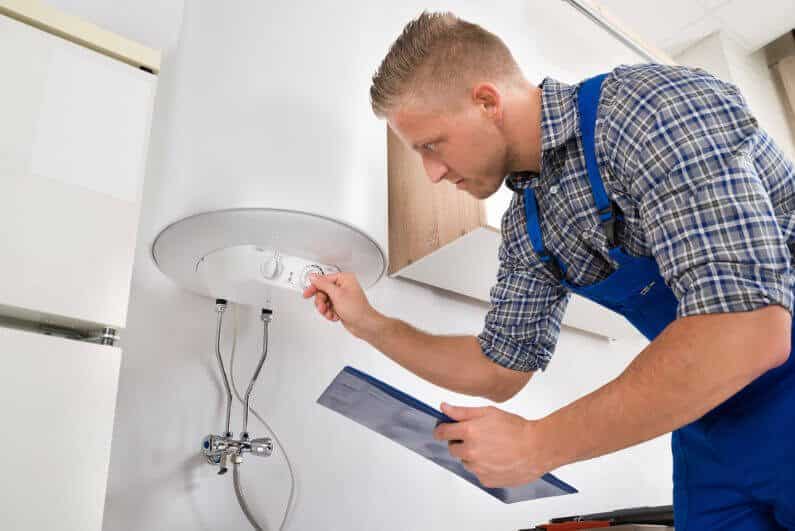
6- Upgrading for Energy Efficiency:
Modern water heaters are designed to be more energy-efficient.
If you have an older unit, fix water heater or upgrade to a newer model can result in energy savings and lower utility bills.
7- Lack of Hot Water:
If your water heater consistently fails to provide sufficient hot water for your needs, it may be a sign that the unit is no longer able to meet the demand and requires replacement.
Regular maintenance, such as draining the tank and checking for signs of wear, can extend the life and fix water heater.
However, if you notice multiple signs indicating the end of its lifespan, consulting with a professional plumber from Al Rooter Plumbing.
They can help you make an informed decision about when to fix water heater.
Water heater leaks can be indicative of various issues. Here are five possible causes for your water heater leaking:
1- Pressure Relief Valve Issues:
The pressure relief valve is designed to release excess pressure inside the tank.
If it malfunctions or is faulty, it may leak water.
2- Corrosion and Rust:
Over time, the inside of the water heater tank can corrode, leading to small holes or cracks.
Corrosion is a common cause of water heater leaks.
If you notice rust around the tank or water with a reddish tint, it may indicate a corroded tank that needs replacement.
3- Faulty Drain Valve:
The drain valve at the bottom of the water heater allows for tank flushing.
If the valve is loose, damaged, or faulty, it can cause water to leak.
Tighten or replace the drain valve to resolve the issue and fix water heater.
4- Leaking Temperature and Pressure Relief (TPR) Valve:
The TPR valve is a safety feature that releases water if the temperature or pressure inside the tank becomes too high.
If the TPR valve is leaking, it may be due to excess pressure, a faulty valve, or issues with the temperature setting.
Adjustments or replacement of the TPR valve may be necessary.
5- Condensation or Sweating:
In humid environments, water heaters can experience condensation, leading to moisture accumulation.
This may be mistaken for a leak.
Additionally, sweating can occur if the temperature of the water inside the tank is significantly higher than the ambient temperature.
Proper insulation and addressing humidity levels can alleviate this issue.
It depends on the extent of damage. If minor, repairing is cost-effective.
For major issues, consider replacement.
Check the pilot light, thermostat settings, and circuit breaker.
If issues persist, consult a professional for repairs.
Possible causes include a faulty thermostat, pilot light issues, sediment buildup, or a malfunctioning heating element.
Sediment buildup is a common issue, affecting heating efficiency.
Regular flushing helps prevent problems and maintains optimal performance.
A: Depending on the specific issue, you may need to replace a heating element, adjust the water temperature settings, flush the water heater tank to remove sediment buildup, or call a professional for repairs.
A: If your electric water heater is running out of hot water quickly, you may need to check for sediment buildup in the tank.
A: Signs that your gas water heater may need repair include a lack of hot water, fluctuating water temperature, unusual noises coming from the water heater, or water leaks around the unit.
A: Water heater maintenance may involve flushing the tank to remove sediment, checking and possibly replacing the anode rod and inspecting for leaks.
A: Depending on the severity of the leak, you may be able to fix a water heater leak on your own by tightening connections, replacing faulty valves, or patching minor leaks.
A: When troubleshooting an electric water heater, check the power supply, inspect the heating elements.
A: Hot water running out quickly in a water heater may be caused by sediment buildup in the tank, a faulty heating element, a malfunctioning thermostat, or an inadequate water heater size for your household’s hot water needs.
A: You may need to replace your water heater if it is approaching the end of its expected lifespan (usually 8-12 years).
A: If you notice water pooling around your water heater, turn off the water supply and consider calling a professional for water heater repair in Houston to address the issue.
| M | T | W | T | F | S | S |
|---|---|---|---|---|---|---|
| 1 | 2 | 3 | 4 | 5 | ||
| 6 | 7 | 8 | 9 | 10 | 11 | 12 |
| 13 | 14 | 15 | 16 | 17 | 18 | 19 |
| 20 | 21 | 22 | 23 | 24 | 25 | 26 |
| 27 | 28 | 29 | 30 | 31 | ||

